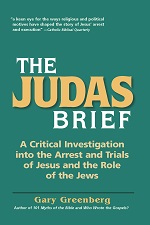

| THE JUDAS BRIEF A critical investigation into the arrest and trials of Jesus and the role of the Jews by Gary Greenberg |
| ● Table of Contents ● Read an excerpt ● Buy this book ● |
 ●
a keen eye for the ways religious and political motives have shaped
the story ●
a keen eye for the ways religious and political motives have shaped
the storyof Jesus' arrest and execution, and acceptance of certain historical elements of canonical accounts . . . Greenberg presses important historical questions and rightly insists on fresh consideration of the evidence, particularly in view of centuries of Christian hostility toward Jewish people and religion that found inspiration in the Gospel accounts of the passion. — Catholic Biblical Quarterly ● The book is very accessible in terms of the manner in which it reads and is well-argued, reflecting a revisionary examination of the ancient literature. It deals head-on with many of the problems that have troubled scholars for years, including the difficult and inconsistent stories of Judas Iscariot, the involvement of Jewish authorities in Jesus' death, and the increasing tendency of the gospel authors to find ways to exonerate Pilate. __ April deConick, Rice University ● This well-documented work . . . presents some interesting history. — Library Journal ● This study is a judicious investigation seeking to shed light on some dark corners of the crucifixion narratives in early Christian sources. The Judas Brief should be required reading for both Christians and Jews, as both communities have much to gain from reflecting on this crucial topic. — Robert R. Stieglitz, Ancient Mediterranean Civilizations, Rutgers University |
|
Judas did not betray Jesus. He tried to save his teacher’s
life.
The Judas Brief
offers the first full-scale historically-based rebuttal to Gospel
accusations that Judas betrayed Jesus and that the Jewish priesthood
demanded that Pilate crucify him. Greenberg concludes that in order
to stop a Roman massacre of Jews, Judas, acting as Jesus’
representative, negotiated a three-way deal with Pilate, the Jewish
High Priest, and Jesus, in which it was agreed that Jesus would
remain under house arrest with the High Priest until after the
holiday, that his followers would not engage in any demonstrations,
and that after the holiday he would be released. But Herod Antipas,
the Galilean ruler, feared Jesus’ popularity in Galilee and
successfully pressured Pilate to break the agreement and execute
Jesus as a threat against Roman order. |
|
Some
astonishing revelations from
The Judas Brief
●
Pre-Gospel Christians did not believe
that Judas betrayed Jesus.
●
Pontius Pilate’s contemporaries
described him as a cruel corrupt murderer who tolerated no
disagreement from Jewish leaders and brutally suppressed any protest
against his rulings.
● The chief Jewish priests had no
political leverage over Pilate and little political support from the
Jewish population.
●
The only major Jewish leader who felt
threatened by Jesus was Herod Antipas, the Roman-appointed ruler of
Galilee, who previously beheaded John the Baptist for speaking out
against Herod’s wickedness. ● The Gospel of John radically differs from and contradicts the other three Gospels regarding the events leading up to the arrest of Jesus. |
|
Back to top |
|
Table of Contents Front piece quotes Dedication Notes on Terminology and Citations 1. Jews in the Dock; Pilate in the Choir 2. The Gospels: Fact, Fiction or Speculation 3. Early Non-Gospel Passion Accounts 4. Religious Outlaws in Roman Israel 5. Pilate Outside of the Gospels 6. Was Pilate that Bad? 7. What Do We Really Know About Judas? 8. Pharisees, Sadducees, Herodians and Priests 9. Jesus in Jerusalem 10. The Arrest 11. The Jewish Proceedings 12. The Roman Proceedings: A Gospel Overview 13. The Roman Proceedings: A Critical Review 14. What Really Happened? Bibliography Back to top |